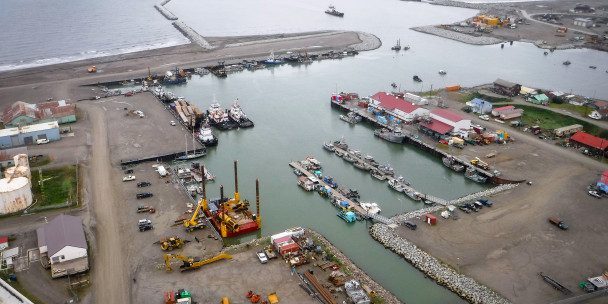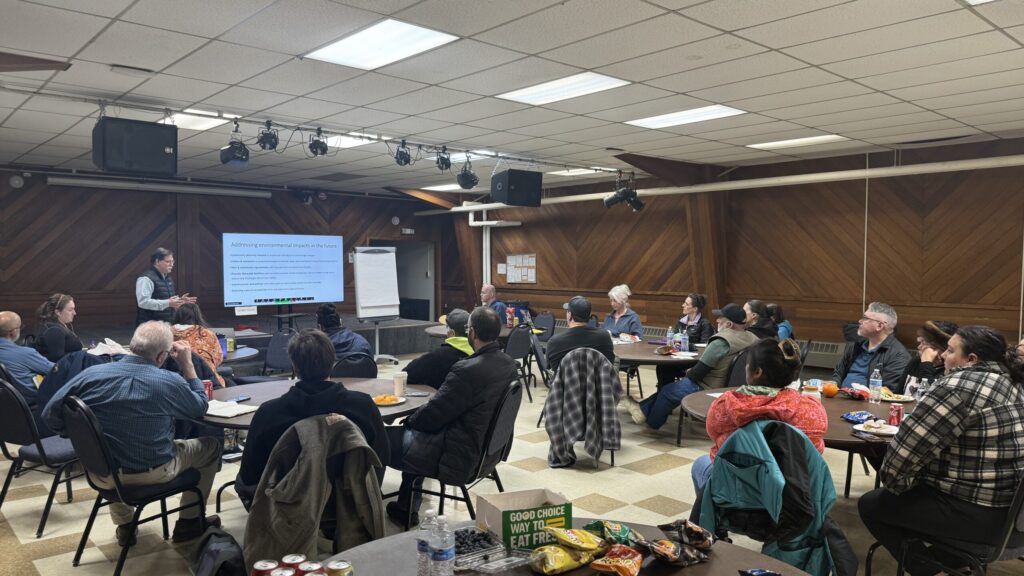What should Nome do in the wake of the U.S. Army Corps of Engineers putting a proposed expansion of the city’s port on pause for the next year? That question dominated Monday’s city council meeting, the first for newly elected Mayor Richard Beneville.
First on the council’s agenda: approving the Nome Emergency Shelter Team, or NEST, to utilize the XYZ senior center for laundry and showers once a week. A memorandum of understanding, or MOU, came up at the last council meeting, but got bogged down over concerns that grants used to build the senior center wouldn’t allow more novel uses like shower and laundry for Nome’s homeless.
Those concerns were laid to rest by an email from a city attorney, summarized by council member Jerald Brown. “An email from the lawyer, basically that ends with the statement ‘no good reason not to enter into the M-O-U,’” Brown said.
Presented alongside updated liability insurance from NEST, it was enough that the council unanimously approved the shelter’s use of the senior center’s laundry and showers once a week.
The council moved quickly through other business, approving a “first look” to new resolutions related to heating oil and fuel contracts for the City of Nome and Nome Public Schools. Also updated was a list of who among the council and city staff are authorized to sign checks and access the city’s financial accounts, a necessary change with new faces in the jobs of mayor, city manger, city clerk, and council member.
Those new faces had a big question to tackle: just how should Nome move forward after news of the Army Corps’ 12-month suspension of a proposed deep-draft expansion of the Nome’s port? The Army Corps cites Shell Oil’s “disappointing” search for Chukchi Sea oil this summer, and the company’s decision to put its Arctic oil ambitions on hold “for the foreseeable future,” as changing the core economics of any Arctic port project. It was a question that led to some debate—with few specifics—between council member Stan Andersen and City Manager Tom Moran.
“We have to have a plan,” Andersen stressed. “I mean, are we going to sit on our thumbs?”
“Nope, we certainly are not,” Moran replied.
But Andersen said other proposed sites for a deep draft port could take the spotlight away from Nome.
“There is still a group that is pushing Port Clarence, and if we don’t watch what’s going on they could push us off to the side,” he cautioned.
“We are not going to sit on our hands,” Moran said. “We have a very active plan in place.”
“We need to have something in writing,” Andersen replied. “What we are doing. I think the public needs to know where we’re going to be spending our time and our money.”
Moran said the city plans to spend that “time and money” seeking other congressional avenues for federal funding of the port expansion, as well as look into public-private partnerships for future expansion. Mayor Beneville added he’s set to meet with Gov. Bill Walker about the issue next week in Juneau. A trip to Washington, D.C. in the near future was also possible, he added. But Beneville reiterated his view that expansion of Nome’s port—and any deep-draft facility in the Arctic—would be about more than oil.
“Shell Oil is Shell Oil, and that’s but one thing,” he began. “We need to remember that there’s a much larger thing down the road. And it has to do with issues well beyond [oil]. It has to do with national security, protection of our rights, we have an accessible shoreline. And coming down the line, I look five to ten years as traffic increases, so it is not just petroleum resources.”
As the meeting closed, the focus shifted briefly from petroleum to fluoride—after the council learned fluoridation of city water had ceased. In an email, utility manager John Handeland says fluoridation of city water had been suspended due to a lack of certified operators.
It was a known issue to City Manager Moran but news to some on the council and the mayor—who directed Moran to “pull the chain” on the Utility Board to comply with city’s own ordinances, which require both chlorine and fluoride be added to the city water supply.







